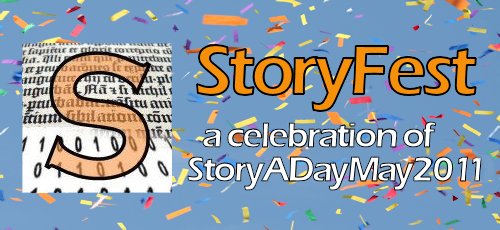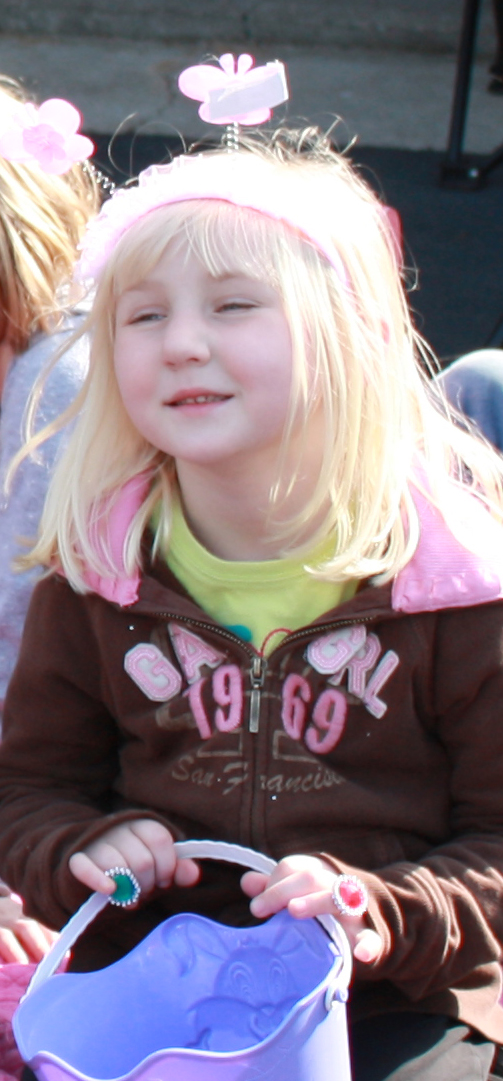(I love wordle.net)
Get your story publication-ready with the StoryADay Editing & Revision Seminar
 I’m excited to announce our very first free, live teleseminar coming up this Friday.
I’m excited to announce our very first free, live teleseminar coming up this Friday.
StoryADay May is all about a creative splurge: massive amounts of writing, experimentation and fun. With any luck we all came out with a handful of stories that surprised us: they were really quite good and maybe there were some that we think we could share with readers. But maybe not quite yet.
Is Your Short Story Publication-Ready?
Editing your writing is hard, but it makes all the difference between a first draft and a publishable story.
On Friday, Sept 9, 2011, at 1:30 PM (EST) come and learn about the different levels and stages of editing.
In this teleseminar you’ll learn about:
- Understanding the different levels of editing and how to use this knowledge to keep from being discouraged,
- How to figure out what you need right now,
- Do It Yourself editing,
- How to effectively get editing help from others.
You’ll also receive an exclusive money-saving offer on my upcoming series of writing seminars aimed specifically at short-story writers.
What It Is
A seminar that you can use your home phone (or cell phone or Skype) to call in to.
I’ll talk for about 20 minutes and take questions at the end. I’ll answer as many as I can. (I’ll mute your phones before I start, so don’t worry about barking dogs or crying babies in the background!)
If you can’t be on the call, live, send your questions to me by email before the call (julie@storyaday.org) and you can download the whole thing after the event (I’ll send out an email to this list with the details, on Friday afternoon).
What It Is Not
There is no fee for this teleseminar (although there may be telephone charges, depending on where you live and what kind of plan you have).
This is a look at how to approach editing and revising your stories. It is NOT a primer on grammar or spelling or where to put your apostrophes. For one thing, I’ve noticed that most of the writers at StoryADay seem to know how to do that stuff – although we all occasionally make slips that must be caught in editing. For another thing, there is a metric ton of information online about how to use grammar. (I suggest you start here.)
How To Join In
Sign up for the StoryADay Creativity Lab to receive all the details including a call-in number and conference code, and more information about that discount on upcoming seminars
If you’ve ever wondered how best to revise your work, join us this Friday, Sept 9 at 1:30 PM (EST) for the StoryADay Creativity Lab Editing & Revision Teleseminar
P.S. Don’t forget, at the end of the call you’ll receive a discount code for 25% off future seminars.
Contest Results at 12 Noon, August 15!
For everyone waiting with baited breath for the results of the first ever Story A Day Contest…
…results will be posted at 12:00 (Eastern US time) on Monday, August 15.
See you then!
Does Thinking Count As Writing?
I asked a friend the other day how her writing was going.
“I’m thinking about writing,” she replied. “Does thinking count for anything?”
Ouch. Sound familiar?
So, you know what I’m going to say, right?
Thinking…well, actually thinking DOES kind of count as writing. (There, did I surprise you? Wait for it…)
But only if you’re doing it in the right way.
(Oo, you knew there was a catch!)
Thinking Kinda Does Count…And It Really Doesn’t
- Writers need to think — We need copious amounts of thinking time. We need to daydream and imagine and ‘what if’. Happily, we can do this while attending to all those routine brain-free tasks we have to do every day: you know, the ones that keep us clothed and fed and sanitary. (If you’re an adult you know what I mean. If you’re a kid…no, if you’re a kid you won’t even be reading this. You’ll just be writing your first best-seller. Move along.)
- Beating ourselves up is not productive — unfortunately a lot of writers (especially the ones who aren’t doing any writing) spend a lot of their thinking time fretting about how they’re not writing, not good enough, a lousy person for not doing more actual writing. This is not only unproductive, it is destructive. The best way to stop this kind of thinking in its tracks is to write something — anything. (Keep reading for ideas on what you can write on a day like this)
- Capturing ideas is useful — sometimes ‘not writing’ means you’re out living. This is a wonderful thing for a writer. You need experience to be able to write anything meaningful. You need to come home and process the stuff that happened to you today, so that it’s there in your brain ready for when you need it. We need to hate people and imagine all the things we should have said to them. We need to love people and freak out when our imaginations show us what life would be like without them. We need to wonder what it would really be like if our plane crashed on a desert island: how would we wash our clothes and what plant fibers could be spun into thread to repair them?
- Thought vs. creativity — There will come a time when you need to look at your work with a critical eye, but that time is not during the initial writing phase. In fact, the less you think while you’re writing your first draft the better. Turn off that brain, move your hands and just let the words pour out.
It’s all very well for me to sit here saying this. But how do you actually move from thinking to writing?
You Must Take Action
You have to actually carve out time to sit down and write. Even if you can’t finish a whole chapter. Even if all you can manage is 100 words, 55 words, 140 characters,
DOING something (i.e. writing, crafting a story and characters) is so much better than thinking. Always.
(You may not feel great while you’re doing it, but trust me, afterwards? You’ll feel awesome.)
How To Take Action With Your Writing
It’s easy to get overwhelmed and beat yourself up because you haven’t finished your first novel yet.
Screw that.
- Set yourself a tiny goal and meet it. Write a twitter fiction story. Write a 55-word story. Write exactly 100 words (no more, no less). Set a deadline. Do the work. Now tell me that didn’t feel good.
- Use prompts — I know it can seem corny but grab a writing prompt and use it for your own purposes. I assigned everyone on my writing course the same prompt one day and you would have been amazed at the radically different stories that came back from 12 different people.
- Embrace the first draft — Give yourself permission to write something truly dreadful. Tell yourself no-one is going to see it. Picture a baby learning to walk: they fall down, they get up again, they fall down, they get up again, and eventually they are up more than they are down. We learn by doing. We learn by making mistakes. Write something terrible, don’t show it to anyone. Remind yourself the goal is to write something, not to write something good. Not yet.
- Get an accountability buddy — life comes at us fast. If you’re like me, there’s nobody knocking down your door to hand you a living wage for your fiction yet. It’s easy to let writing slip into the background and — whoosh! — a month has gone by without a single word written. By finding someone to keep you honest, you give yourself the kind of deadlines that you need. You don’t even have to swap writing samples. Just make sure you find someone who will stay on your case and not be too nice to you!
- So yes, think. Think about your writing. Think about your characters. Think about what you’ll do when you’ve reached your goals.But most of all, keep writing.
What one thing will you commit to writing this week? How will you make it happen?
Leave your commitment below, & I will be your accountability buddy for this week (I will personally check up on you on Wed June 22!)
StoryFest 2011 Preparations
We have all worked so hard, don’t you think it’s fair that we get to show off a little; celebrate?
Announcing:
The Story A Day StoryFest, June 11-14, 2011:
An Online Celebration of the Second Annual Story A Day Challenge
What Is It?
From June 11-13 the front page of this site will change to the StoryFest Page.
The StoryFest page will contain blurbs about and links to each author’s favorite story (or collection of stories if you’re writing super-short stories)
Readers can come by on their coffee breaks, browse the best of our work, leave comments, tell their friends.
(See last year’s StoryFest front page, to see what I’m talking about.)
What Do You Do?
- First, pick your favorite Story A Day stories that you wrote (this can be the same story you intend to enter in the contest). Pick one, if it’s a long or multi-part story. Pick a couple if they are short. Pick ten if you’re a twitter-fiction writer
 No real restrictions here.
No real restrictions here. - Write a short blurb about you/your stories/the challenge (about 50-75 words).
- Optional extra: pick your favorite one or two stories by other people to recommend to readers.
- Email a blurb and the links to your own stories and your ‘recommended reading’ stories as soon as possible. (editor at story a day dot org / subject: StoryFest Submission) I will put them on the StoryFest page for readers to find.
- On June 11, start tweeting and blogging and Facebooking (sorry) and telling all your friends and family to stop by. (I will provide some sample messages, in case you’re uncomfortable with self-promotion, but you should feel free to write whatever you like.
- During StoryFest be sure to share your recommendations for stories you’ve enjoyed by other StADa writers.
- On June 13, send another reminder to people that time is running out, to access the StoryFest page, and discover all the wonderful new writers that you’ve been reading and enjoying throughout May.
- Sit back and bask in the feedback.
I’ve created a StoryADay StoryFest graphic that you can hang on your StoryFest stories, no matter where you posted them (here or your personal blog)
What Can Readers Do?
Readers can stop by any time between June 11 and June 14.
They will find the front page all decked out for StoryFest and featuring links to your favorite stories.
They can read, comment and, I hope, recommend stories to their reading friends.
What’s The Point?
It’s a celebration! Writing a story a day was hard, wasn’t it?
This is our chance to show off. This is our recital. (Tutus strictly optional).
It’s also a chance for readers and writers to connect. Readers are always looking to find great new writers and interesting stories. Writers want to be found.
I’ve been thrilled by the quality and diversity of the stories I’ve read here, and I want to share that with other readers.
Why So Short?
Making the StoryFest an event with a limited timeline gives readers a good reason to come NOW, not just think ‘that’s cool, I’ll stop by later maybe’ and then forget about us. Instead, we’re creating scarcity and a deadline. It’s basic sales psychology, and it works!
None of the Story A Day blogs will disappear (unless you delete them), so readers can still find your stuff for as long as you want them to.
The StoryFest is just a big promotional/celebratory party, and we all know that at some point, every party has to wrap up and someone has to turn out the lights.
(Luckily, no one will have to mop anything up after this one.)
A Time To Live
I was going to be starting the StoryADay Warm-Up Your Writing Summer Course today, but I’ve decided to postpone it until September.
I’m going to explain why and then I’m going to offer you some free tools, and a chance to help a worthy cause. If you just want the goodies, you can skip ahead.
Why I’m Not Running The Warm Up Writing Course This June
I live in one of those mythical neighbourhoods where everyone knows everyone else and we like each other. We have Easter Egg hunts and a Christmas party and our kids all ride bikes and play in the street together all summer and there is always a parent or five hanging out with them. It’s the kind of neighbourhood where you know that if your kid does something stupid while you’re not looking, one of the other parents will hunker down and gently discuss why ‘we don’t that’ and negotiate a peace treaty between whichever kids need it.
And if anyone needs help, the neighbourhood springs into action.
And we’re springing into action.
Last weekend my next door neighbour’s five year old daughter, Gabriella, was suddenly admitted to the local children’s hospital and diagnosed with a rare and aggressive brain cancer.
So we’re babysitting and running errands and making sure life seems as normal as we can for all the kids here at home. We’re raising money and cooking meals and organizing prayer chains and trying to be available for anything our friends might need.
And yes, though all this I could find time to run the course. But I wouldn’t be able to give it my all, and that’s not fair to anyone. So I’m postponing until September, when I will offer the Warm-Up Your Writing Course again, at the summer rate.
And in the meantime, I’m going to spend the summer creating high-quality free content and tools to help my lovely StoryADay friends focus on creativity and productivity and to keep writing every day, not ‘someday’.
An Important Reminder For Writers
But this bump in the road has reminded me of a very important rule for writers:
As important as it is to keep writing, it’s even more important to keep living. Only by grabbing life with both hands and holding on tight through every experience, can we hope to be able to write stories that help, heal, entertain, make readers think, and, in our own small way, change the world for the better.




